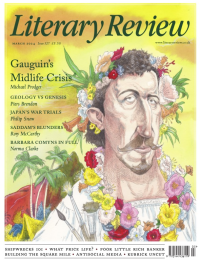David Abulafia
Europe and All That
How the World Made the West: A 4,000-Year History
By Josephine Quinn
Bloomsbury 576pp £30
The study of classics, Josephine Quinn avers, is in crisis. The very term ‘classics’ is questionable, since it implies a position of cultural supremacy. Beginning with John Colet’s Renaissance syllabus five hundred years ago, a diet exclusively of Greek and Latin was commonly served in English public schools, in order to provide a supposedly perfect education to those who would go on to occupy commanding positions in society. By the 19th century, the notion had also developed that the Roman Empire was worth studying as a model for modern empires, and that learning about the battles of Julius Caesar was a good way to master the modern art of war. This meant that a certain amount of ancient history was studied alongside grammar and syntax, but even today ‘ancient history’ in university syllabuses indicates the history of ancient Greece and Rome, and ‘Greece’ mainly means Athens. Close neighbours with whom the Greeks and Romans engaged, such as the Etruscans and the Carthaginians, might have walk-on parts in the story, but even the Persians are examined only from the perspective of Herodotus’s account of their attempt to subdue Athens. Ask classicists about the daily life of the Volscians (as in Shakespeare’s Coriolanus) and they will likely be lost for words, even though chapters of Livy brim with their warriors. Nor do classicists have much to say about the early history of Gaul, Carpathia and other lands where writing was not used. The consensus is that their inhabitants count as ‘prehistoric’ and unworthy of study within an ancient history syllabus.
A broader view of antiquity, and indeed of the Middle Ages, is therefore required. Quinn is the right person to provide it: she teaches in the classics faculty at Oxford, while her previous book was concerned with the Phoenicians (known in Greek as Phoinikes, ‘purple traders’) – or rather not concerned with them, as her argument was that they did not really think of themselves as a coherent group. Instead, they identified with their city of origin, whether Tyre, Sidon or Carthage.
Alongside the argument about the need to understand a bigger, connected ancient world, Quinn presents two further arguments about the way we look at civilisation. Her first point is that American universities have a long tradition of teaching ‘Western civ’ and of placing western Europe – first Greece and Rome,

Sign Up to our newsletter
Receive free articles, highlights from the archive, news, details of prizes, and much more.@Lit_Review
Follow Literary Review on Twitter
Twitter Feed
The latest volume of T S Eliot’s letters, covering 1942–44, reveals a constant stream of correspondence. By contrast, his poetic output was negligible.
Robert Crawford ponders if Eliot the poet was beginning to be left behind.
Robert Crawford - Advice to Poets
Robert Crawford: Advice to Poets - The Letters of T S Eliot, Volume 10: 1942–1944 by Valerie Eliot & John Haffenden (edd)
literaryreview.co.uk
What a treat to see CLODIA @Lit_Review this holiday!
"[Boin] has succeeded in embedding Clodia in a much less hostile environment than the one in which she found herself in Ciceronian Rome. She emerges as intelligent, lively, decisive and strong-willed.”
Daisy Dunn - O, Lesbia!
Daisy Dunn: O, Lesbia! - Clodia of Rome: Champion of the Republic by Douglas Boin
literaryreview.co.uk
‘A fascinating mixture of travelogue, micro-history and personal reflection.’
Read the review of @Civil_War_Spain’s Travels Through the Spanish Civil War in @Lit_Review👇
John Foot - Grave Matters
John Foot: Grave Matters - Travels Through the Spanish Civil War by Nick Lloyd; El Generalísimo: Franco – Power...
literaryreview.co.uk